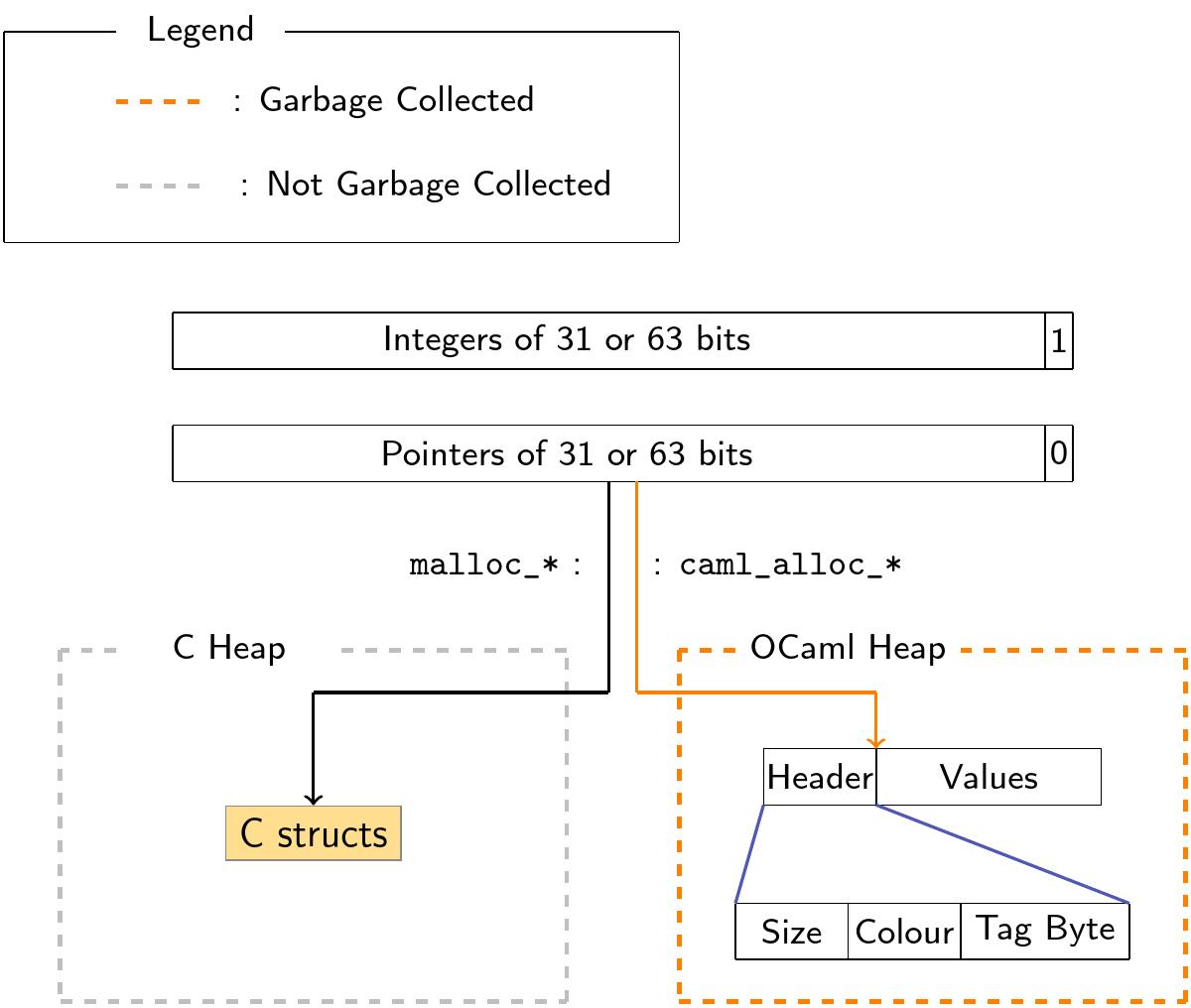Incorporating non-OCaml Code into your Project
Add C code to your OCaml project
Overview
OCaml Internals
Recommended Workflow
Interacting with C from OCaml
Interacting with OCaml from C
Real World Examples
Overview
Sometimes OCaml just can't do what lower level languages can do or you want to use pre-existing code written in C or Rust from OCaml.
OCaml Internals
Programming languages must have a representation of data at runtime, for example how should OCaml represent type camel = Dromedary of int in memory? When you interface between two languages much of the battle is converting in-and-out of each programming language's internal data represenation. A detailed introduction of OCaml's internal data representation is given in the manual, what follows is a brief summary.
OCaml has a uniform memory representation where everything is a word-sized value. These can either be immediates (represented as unboxed integers) or non-immediates (pointers to a block stored in the OCaml or the C heap). Boxing is the process of wrapping additional meta-data around a value much like IP packets and their header.

To distinguish between immediates and non-immediates (pointers), OCaml uses a tag bit in the least significant bit as a flag. When it is set to 1 this indicates an immediate, otherwise it should be interpreted as a pointer. This means on a 32-bit machine OCaml integers can only be 31-bit. The runtime value of the number 7 in OCaml is actually 15. The conversion function can be seen here in the OCaml compiler.
Integers are not the only values represented as immediates. Normal and polymorphic variants with constant constructors are represented as immediates, the latter as a hash of the constructor name. The built-in boolean values are also immediates i.e. true is 1 (which in OCaml is 3) and false is 0 (1 in OCaml).
# type vehicle = Car | Bicycle of string | Truck
type vehicle = Car | Bicycle of string | Truck
# type poly = [`String | `Int]
type poly = [ `Int | `String ]
# true
- : bool = true
Variants with non-constant constructors are heap allocated as blocks (only the non-constant ones). Blocks in the heap start with a one-word header, either 32 or 64-bit depending on the architecture, which contains information about the length of the value (22 or 54 bits), 2 bits for a colour which is used in garbage collection and 8 bits for a multi-purpose tag byte to indicate what the block is. The type unsafe Obj module lets you inspect the runtime information of values.
# Obj.tag (Obj.repr Car)
- : int = 1000
# Obj.is_int (Obj.magic Car)
- : bool = true
# Obj.tag (Obj.repr (Bicycle "electric"))
- : int = 0
# Obj.is_block (Obj.magic (Bicycle "electric"))
- : bool = true
# Obj.tag (Obj.repr `String)
- : int = 1000
# Obj.tag (Obj.repr (fun x -> x))
- : int = 247
Recommended Workflow
Interacting with C from OCaml
To interact with C code you need to use the Foreign Function Interface (FFI) in OCaml and make some changes to your dune files to incorporate the extra code. To use a foreign C function in OCaml you need to add:
external <ocaml-name> : <type-of-function> = "<c-function-name>"
The C function will take OCaml values as arguments (which will be encoded using the data representation previously described). For example if we want to have an external C add function the C file would be.
#include <caml/mlvalues.h>
value add_c(value a, value b)
{
return Val_long(Long_val(a) + (Long_val(b)));
}
To access the code in OCaml we define an external add function and give it proper OCaml types within our main.ml file.
external add : int -> int -> int = "add_c"
let () = print_int (add 10 10)
Finally we compile everything using dune and the foreign_stubs optional field.
(executable
(name main)
(foreign_stubs
(language c)
(names add)))
Interacting with OCaml from C
Sometimes you might want to do the inverse and access parts on an OCaml program from a C program. This still suffers from the data represenation shuffling that might need to take place. There are two main ways that you may want to call OCaml from C. Either as callbacks (OCaml calls C which calls OCaml) or just directly from a main C program. The latter requires you to initialise the OCaml code by calling caml_main.
In order for C to find OCaml functions you need to register them as callbacks using Callback.register. This small example calls a fibonacci function written in OCaml from C. Note the additional C compiler parameters in the Makefile for linking in the standard library and only producing an object OCaml file.
Real World Examples
Digestif implements many common hashing algorithms both in C and OCaml.
Cstruct is a library that allows you to read and write structures from the C programming language. It is used in many applications for handling things like packets, for example in the Git implementation in pure OCaml.
